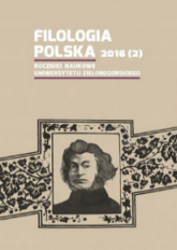Mickiewicz seen by the “great” and “minor” Slavs (reconnaissance)
Keywords
Abstract
Adam Mickiewicz was sentenced for his subversive activity into exile to Russia and arrived there in 1824. Both in Petersburg and in Moscow he met many Polish émigrés with whom he kept very close relations. He also made acquaintance and soon friendship with many antirégime disposed Russians. Staying in Moscow, Mickiewicz was often invited to princess Volkonskaya’s palace where he became famous for his French improvisations. He was bound by ties of especial and a little bit ambivalent friendship with Alexander Pushkin. Just in Russia Mickiewicz wrote and published his Crimean Sonnets and Konrad Wallenrod. These poetic works made him known as “Slavic Byron”. When Mickiewicz was leaving Russia in 1829, a company of his close Russian friends served him a farewell party. Being set free and having finally obtained his passport he headed for Germany. Going from Berlin to Dresden he must have traversed Lusatia. It is hard to guess if Mickiewicz was aware then that the Slavic minority, namely Lusatian Sorbs, still lived there. He mentioned them, especially their early history, during his lectures held at Collège de France. Mickiewicz had probably no idea that the Sorbian national revival movement was being initiated just then. Sorbian national activists were inspired by the Slavic literatures, mainly Czech, Russian and Polish. The greatest Sorbian poet Jakub Bart-Ćišinski admired Mickiewicz’s poetry and called him one of “the crystal stars of Poland”. Summing up, Mickiewicz stayed in Russia for five years and published his poetic works. He was known among Sorbs of Lusatia mainly for his works. However, his poetry was highly admired both by the “great” and by the “minor” Slavs.
References
LITERATURA CYTOWANA
Adam Mickiewicz. Basni w serbskich pśełožkach, oprac. A.Měškank, red. M. Norberg, P. Kosta, Potsdam 2013.
[Google Scholar]
Batowski H., Mickiewicz jako badacz Słowiańszczyzny, Wrocław 1956.
[Google Scholar]
Ćišinskeho listowanje z Muku a Černym, wudałoj z přispomnjenjemi M. Krječmar a P. Nowotny, Budyšin 1958.
[Google Scholar]
Fiszman S., Mickiewicz w Rosji, Warszawa 1949.
[Google Scholar]
Galster B., Słowo wstępne.[w:] J. Łotman, Aleksander Puszkin, Warszawa 1990.
[Google Scholar]
Gomolicki L., Mickiewicz wśród Rosjan. Warszawa, 1950.
[Google Scholar]
Kameneva N. F., Mickevič v russkoj literature. Pisateli o pisateljach, Moskva 1998.
[Google Scholar]
Koropeckyj R., Adam Mickiewicz. Życie romantyka, przeł. M.Glasenapp, Warszawa 2013.
[Google Scholar]
Leszczyński R., My i oni. Kontakty kulturalne Polaków i Łużyczan, Opole 2000.
[Google Scholar]
Ławski J., Mickiewicz – mit – historia. Studia, Białystok 2010.
[Google Scholar]
Magnuszewski J., Literatura polska w kręgu literatur słowiańskich,Wrocław 1993.
[Google Scholar]
Mickiewicz A., Literatura słowiańska wykładana w Kolegium Francuzkiem przez Adama Mickiewicza, tłumaczenie Felixa Wrotnowskiego. Rok pierwszy 1840-1841, Poznań 1865.
[Google Scholar]
Mucha B., Adam Mickiewicz czasów emigracji i Rosjanie, Łódź 1997.
[Google Scholar]
Petr J., Adam Mickiewicz a Łużyce, „Pamiętnik Słowiański” 1958 (6).
[Google Scholar]
Pruszyński K., Opowieść o Mickiewiczu, Warszawa 1998.
[Google Scholar]
Witkowska A., Mickiewicz. Słowo i czyn, Warszawa 1984.
[Google Scholar]
Preview
Downloads
Published
How to Cite
Issue
Section
Categories
Copyright & License

This work is licensed under a Creative Commons Attribution-NonCommercial-NoDerivatives 4.0 International License.
Copyrights (a). In principle, authors who are not employed by the University of Zielona Góra retain the copyright, including publishing rights to the articles, without restrictions.
Copyrights (b). In principle, authors who are employed by the University of Zielona Góra, do not retain the copyright, including publishing rights to the articles. In such cases the copyright holder is the University of Zielona Góra.
Print ISSN
2450-3584-
Abstract83











































